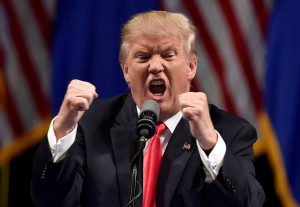After the surprise announcement of the US presidential results, relations between major world powers seem to be in flux. Stratfor analysts remain convinced that one of the United States’ greatest geopolitical imperatives is to prevent the rise of regional powers that would be able to challenge Washington.
As it’s been noted, Russia’s historical dominance of Eurasia, the Soviet Union’s rise as a superpower after World War II and its resulting political, economic and military rivalry with the United States have long made Russia a target of Washington’s actions abroad. But the onset of the Cold War and the expansion of Soviet power — itself an outgrowth of Russia’s own strategic imperatives to buffer its heartland from invasion — gave rise to a US strategy known as containment.
Even after the demise of the Soviet Union, the United States continued to apply the policy of containment to the newly formed Russian Federation, despite the fact that it no longer posed a global challenge to the United States. Washington must have been afraid of a state that wielded considerable demographic, economic and military resources. Those, along with its location, positioned Russia to re-emerge as a formidable regional power. In part to try to prevent its resurgence, the United States supported the expansion of NATO and the European Union into the former Eastern Bloc.
However, the 45th President of the United States has made it clear that Russia could expect a bargain between Washington and Moscow, by stating that the United States might ease sanctions against Russia in exchange for a nuclear arms reduction deal.
However, it’s been noted that even though Russia is an active geopolitical player, one could hardly describe it as a rapidly growing one. It’s been noted by military strategist Andrew Krepinevic that by the 2030s — Russia may become less dangerous than Iran from the point of view of Washington.
Therefore, Western think tanks are trying to warn the White House that China may be much more of a threat to Washington than any other state, because of it’s a rapidly growing power. For this reason, Washington has been seeking ways to contain Beijing as well.
That is why some reasonable Western experts have been stating time and time again that instead of seeking confrontation with Moscow and Beijing, it would more realistic, mature and constructive for the US to try to improve relations simultaneously with both China and Russia. This would be preferable to attempting to leverage one against the other. Improved relations between major world powers across the board could go a long way to bringing global order out of the current slide toward anarchic disorder, rivalry, and escalating violence.
As for European think tanks, they are convinced that Russia and China are hardly a problem, and what Washington should seek to avoid is the collapse of the EU. That is why Brussels is urging Donald Trump to take steps to prevent Europe from drowning in growing chaos and instability. Yet, the sad truth is that regardless of the figure that Americans elect as their leader, Washington’s imperative of containing regional players will continue to be a mainstay of its foreign policy. However, one would like to believe that Donald Trump would be much wiser than Barack Obama was, who pursued the destabilization of whole regions of the world in order to obtain financial and political gains from it.
Martin Berger is a freelance journalist and geopolitical analyst, exclusively for the online magazine “New Eastern Outlook.”

